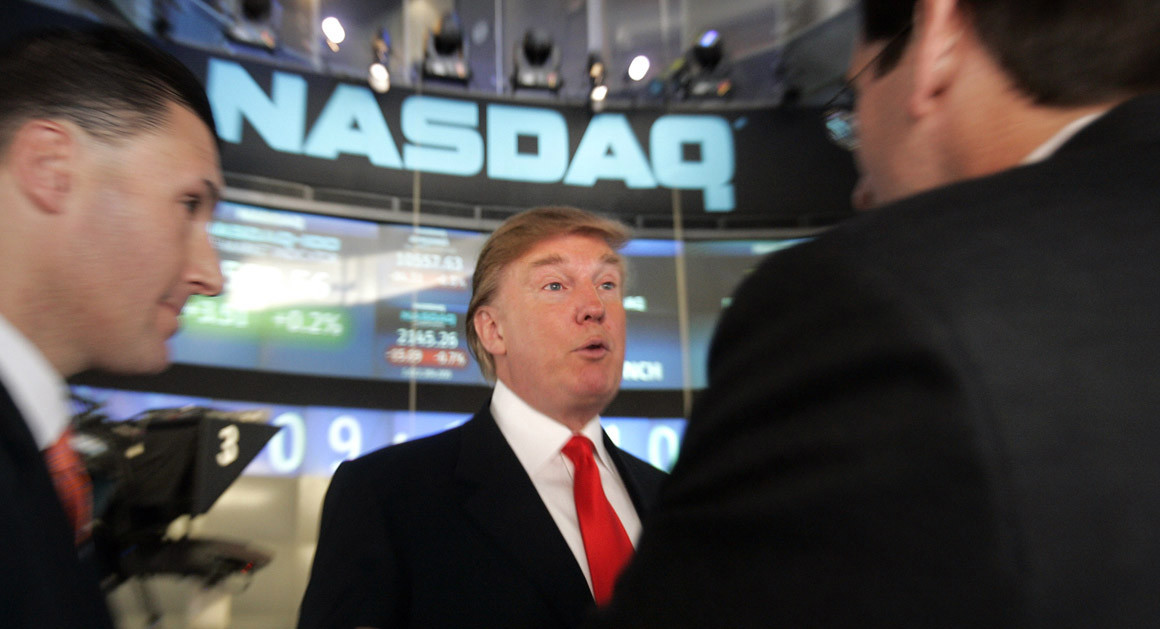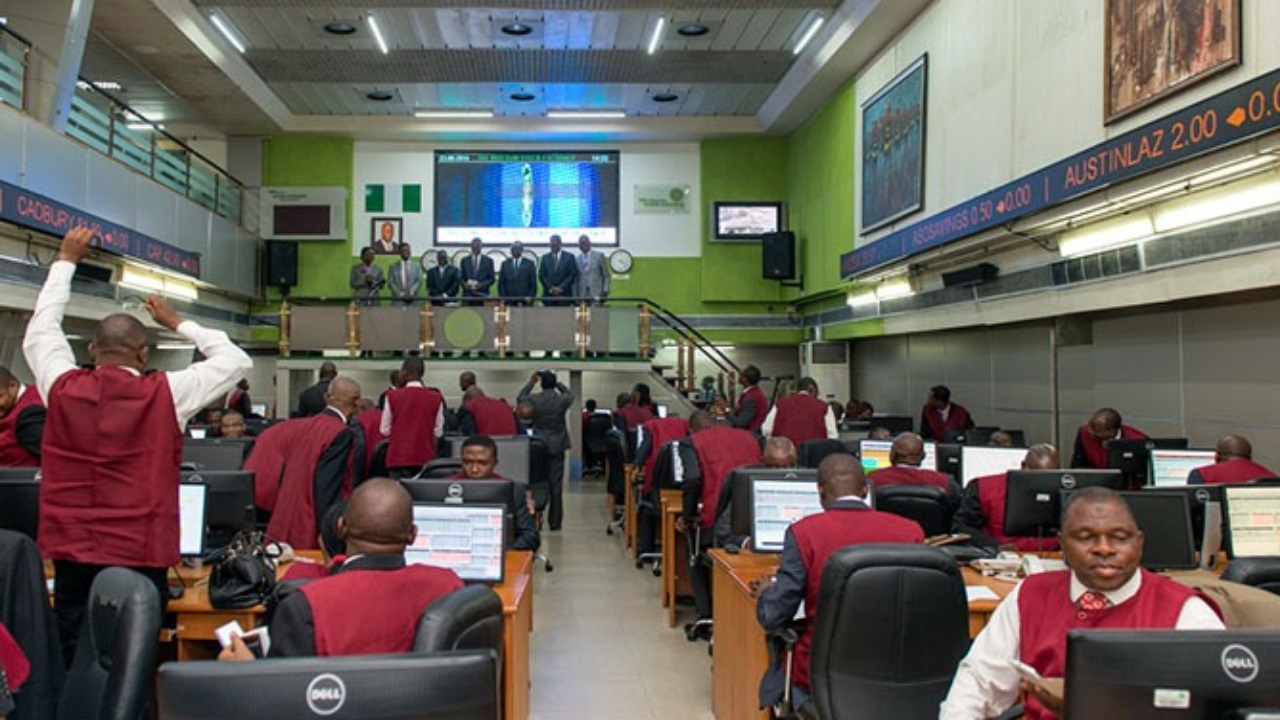Economy
Trade War Once Again in Focus on Wall Street

By Investors Hub
The major U.S. index futures are pointing to a lower opening on Friday, with stocks likely to extend the pullback seen in the previous session.
Renewed trade war concerns may weigh on the markets after President Donald Trump indicated a willingness to impose tariffs on all Chinese imports to the U.S.
“I’m ready to go to 500,” Trump said in an interview with CNBC that aired this morning, apparently referring to the $505.5 billion of Chinese imports to the U.S. in 2017.
“I?’ not doing this for politics, I’m doing this to do the right thing for our country,” Trump said. “We have been ripped off by China for a long time.”
The Trump administration previously imposed tariffs of $34 billion worth of Chinese imports and has threatened to impose tariffs on another $200 billion worth of goods.
Trump argued the strength in the stock market since his election has allowed him to be more aggressive on trade, claiming, ?We?re playing with the bank?s money.”
Stocks moved mostly lower during trading on Thursday, giving back some ground after trending higher over the past several sessions. The major averages moved to the downside early in the session and remained stuck in the red throughout the day.
The major averages ended the day firmly in negative territory. The Dow slid 134.79 points or 0.5 percent to 25,064.50, the Nasdaq fell 29.15 points or 0.4 percent to 7,825.30 and the S&P 500 dropped 11.13 points or 0.4 percent to 2,804.49.
Profit taking contributed to the pullback on Wall Street, as some traders cashed in on the upward move seen in recent sessions.
Recent strength in the markets lifted the Nasdaq to a record closing high on Tuesday, while the S&P 500 ended the previous session at its best closing level in over five months. The Dow also reached a monthly closing high.
A negative reaction to disappointing earnings news from several big-name companies also weighed on the markets on the day.
Shares of eBay (EBAY) moved sharply lower after the e-commerce giant reported better than expected second quarter earnings but provided disappointing full-year guidance.
Insurance giant Travelers (TRV) also came under pressure after reporting second quarter earnings below analyst estimates.
Shares of American Express (AXP) also moved to the downside after the credit card giant reported second quarter earnings that beat expectations but on weaker than expected revenues.
On the other hand, shares of IBM Corp. (IBM) jumped after the tech giant reported second quarter results that exceeded analyst estimates on both the top and bottom lines.
Traders were also reacting to comments by President Donald Trump, who said in an excerpt of an interview with CNBC that he is “not thrilled” with interest rate hikes by the Fed.
“I’m not thrilled,” Trump said in the interview set to air in full on Friday. “Because we go up and every time you go up they want to raise rates again. I don’t really ? I am not happy about it.”
At the same time, Trump noted he is letting the Fed do “what they feel is best,” and a subsequent statement from the White House said the president respects the independence of the central bank.
Meanwhile, traders largely shrugged off a report from the Labor Department showing initial jobless claims unexpectedly dropped to their lowest level in almost five decades in the week ended July 14th.
The Labor Department said initial jobless claims fell to 207,000, a decrease of 8,000 from the previous week’s revised level of 215,000. Economists had expected jobless claims to inch up to 220,000.
With the unexpected decrease, jobless claims dropped to their lowest level since hitting 202,000 in December of 1969.
A separate report from the Conference Board also showed a slightly bigger than expected increase by its index of leading U.S. economic indicators in the month of June.
Steel stocks turned in some of the market’s worst performances on the day after moving sharply higher over the two previous sessions. Reflecting the weakness in the sector, the NYSE Arca Steel Index slumped by 2 percent.
Considerable weakness was also visible among financial stocks, with the NYSE Arca Broker/Dealer Index and the KBW Bank Index both falling by 1.4 percent.
Pharmaceutical, telecom, and gold stocks also moved notably lower, while natural gas, real estate, and housing stocks moved to the upside.
Economy
Nigeria’s Economy Expands 4.07% in Q4 2025

By Adedapo Adesanya
Nigeria’s economy, measured by gross domestic product (GDP), grew by 4.07 per cent (year-on-year) in real terms in the fourth quarter (Q4) of 2025.
The National Bureau of Statistics (NBS) announced the development in its latest GDP report for Q4 2025 on Friday.
The latest figure represents an improvement over the 3.76 per cent growth recorded in the corresponding period of 2024, signalling sustained recovery across key sectors of the economy. The growth rate was faster than the third quarter’s 3.98 per cent.
The report confirmed that Nigeria’s oil sector grew 6.79 per cent year-on-year and the non-oil part of the economy expanded by 3.99 per cent.
Nigeria’s average daily oil production stood at 1.58 million barrels per day in the final three months of 2025. That was lower than the third quarter’s output of 1.64 million barrels per day but higher than the 1.54 million barrels per day in the fourth quarter of 2024.
Breakdown of the data showed that the agriculture sector grew by 4.00 per cent in the fourth quarter of 2025. This marks a significant increase compared to the 2.54 per cent growth recorded in the same quarter of 2024, reflecting improved output and resilience in the sector.
The industry sector also recorded a stronger performance during the period under review. It grew by 3.88 per cent year-on-year, up from 2.49 per cent posted in the fourth quarter of 2024. The improvement suggests enhanced activity in manufacturing, construction, and related industrial sub-sectors.
The services sector maintained its position as a major growth driver, expanding by 4.15 per cent in Q4 2025. However, this was slightly lower than the 4.75 per cent growth recorded in the corresponding quarter of the previous year.
Overall, the 4.07 per cent GDP growth in the final quarter of 2025 underscores broad-based expansion across agriculture, industry, and services, despite a marginal moderation in services growth.
The Q4 performance provides further evidence of strengthening economic momentum, with improvements recorded in both agriculture and industry compared to the previous year.
Economy
Flour Mills Supports 2026 Paris International Agricultural Show

By Modupe Gbadeyanka
For the second time, Flour Mills of Nigeria Plc is sponsoring the Paris International Agricultural Show (PIAS) as part of its strategies to fortify its ties with France.
The 2026 PIAS kicked off on February 21 and will end on March 1, with about 607,503 visitors, nearly 4,000 animals, and over 1,000 exhibitors in attendance last year, and this year’s programme has already shown signs of being bigger and better.
The theme for this year’s event is Generations Solution. It is to foster knowledge transfer from younger generations and structure processes through which knowledge can be harnessed to drive technological advancement within the global agricultural sector.
In his address on the inaugural day of the Nigerian Pavilion on February 23, the Managing Director for FMN Agro and Director of Strategic Engagement/Stakeholder Relations, Mr Sadiq Usman, said, “At FMN, our mission is Feeding and Enriching Lives Every Day.
“This is a mandate we have fulfilled through decades of economic shifts, rooted in a culture of deep resilience and constant innovation. We support this pavilion because FMN recognises that the next frontier of global Agribusiness lies in high-level technical exchange.
“We thank the France-Nigeria Business Council (FNBC), the organisers of the PIAS, and our fellow members of the Nigerian Pavilion – Dangote, BUA, Zenith, Access, and our partners at Creativo El Matador and Soilless Farm Lab— we are exceedingly pleased to work to showcase the true face of Nigerian commerce.”
Speaking on the invaluable nature of the relationship between Nigeria and France, and the FMN’s commitment to process and product innovation, Mr John G. Coumantaros, stated, “The France – Nigeria relationship is a valuable partnership built on a shared value agenda that fosters remarkable Intercontinental trade growth.
“Also, as an organisation with over six decades of transformational footprint in Nigeria and progressively across the African Continent, FMN has been unwaveringly committed to product and process innovation.
“Therefore, our continuous partnership with France for the success of the Paris International Agricultural Show further buttresses the thriving relationship between both countries.”
PIAS is one of the most widely attended agricultural shows, with thousands of people from across the world in attendance.
Economy
NEITI Backs Tinubu’s Executive Order 9 on Oil Revenue Remittances

By Adedapo Adesanya
Despite reservations from some quarters, the Nigeria Extractive Industries Transparency Initiative (NEITI) has praised President Bola Tinubu’s Executive Order 9, which mandates direct remittances of all government revenues from tax oil, profit oil, profit gas, and royalty oil under Production Sharing Contracts, profit sharing, and risk service contracts straight to the Federation Account.
Issued on February 13, 2026, the order aims to safeguard oil and gas revenues, curb wasteful spending, and eliminate leakages by requiring operators to pay all entitlements directly into the federation account.
NEITI executive secretary, Musa Sarkin Adar, called it “a bold step in ongoing fiscal reforms to improve financial transparency, strengthen accountability, and mobilise resources for citizens’ development,” noting that the directive aligns with Section 162 of Nigeria’s Constitution.
He noted that for 20 years, NEITI has pushed for all government revenues to flow into the Federation Account transparently, calling the move a win.
For instance, in its 2017 report titled Unremitted Funds, Economic Recovery and Oil Sector Reform, NEITI revealed that over $20 billion in due remittances had not reached the government, fueling fiscal woes and prompting high-level reforms.
Mr Adar described the order as a key milestone in Nigeria’s EITI implementation and urged amendments to align it with these reforms.
He affirmed NEITI’s role in the Petroleum Industry Act (PIA) and pledged close collaboration with stakeholders, anti-corruption bodies, and partners to sustain transparent management of Nigeria’s mineral resources.
Meanwhile, others like the Petroleum and Natural Gas Senior Staff Association of Nigeria (PENGASSAN) have kicked against the order, saying it poses a serious threat to the stability of the oil and gas industry, calling it a “direct attack” on the PIA.
Speaking at the union’s National Executive Council (NEC) meeting in Abuja on Tuesday, PENGASSAN President, Mr Festus Osifo, said provisions of the order, particularly the directive to remit 30 per cent of profit oil from Production Sharing Contracts (PSCs) directly to the Federation Account, could destabilise operations at the Nigerian National Petroleum Company (NNPC) Limited.
Mr Osifo firmly dispelled rumours of imminent protests by the union, despite widespread claims that the controversial executive order threatens the livelihoods of 10,000 senior staff workers at NNPC.
He noted, however, that the union had begun engagements with government officials, including the Presidential Implementation Committee, and expressed optimism that common ground would be reached.
Mr Osifo, who also serves as President of the Trade Union Congress (TUC), expressed concerns that diverting the 30 per cent profit oil allocation to the Federation Account Allocation Committee (FAAC), without clearly defining how the statutory management fee would be refunded to NNPC, could affect the salaries of hundreds of PENGASSAN members.
-

 Feature/OPED6 years ago
Feature/OPED6 years agoDavos was Different this year
-
Travel/Tourism10 years ago
Lagos Seals Western Lodge Hotel In Ikorodu
-

 Showbiz3 years ago
Showbiz3 years agoEstranged Lover Releases Videos of Empress Njamah Bathing
-

 Banking8 years ago
Banking8 years agoSort Codes of GTBank Branches in Nigeria
-

 Economy3 years ago
Economy3 years agoSubsidy Removal: CNG at N130 Per Litre Cheaper Than Petrol—IPMAN
-

 Banking3 years ago
Banking3 years agoSort Codes of UBA Branches in Nigeria
-

 Banking3 years ago
Banking3 years agoFirst Bank Announces Planned Downtime
-

 Sports3 years ago
Sports3 years agoHighest Paid Nigerian Footballer – How Much Do Nigerian Footballers Earn




















